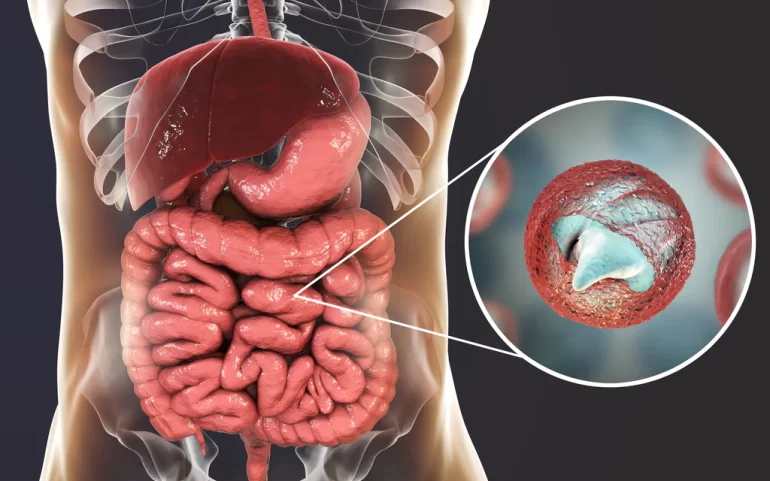How Nizonide Effectively Treats Intestinal Parasites
Parasitic infections are a global health issue, affecting millions of people each year, particularly in developing countries with limited access to clean water and sanitation. One of the most common types of parasitic infections is caused by intestinal parasites, which can severely impact the digestive system and overall health. Nizonide, a medication containing Nitazoxanide 500 mg, has emerged as an effective treatment for a wide range of intestinal parasitic infections. This article will explore how Nizonide works, its benefits, the conditions it treats, and why it is considered a go-to solution for intestinal parasites.
Understanding Intestinal Parasites
Intestinal parasites are organisms that live in the intestines and feed off the host, often leading to malnutrition, gastrointestinal discomfort, and more serious complications if left untreated. These parasites can be divided into two main categories:
- Protozoa – Single-celled organisms such as Giardia lamblia and Entamoeba histolytica.
- Helminths – Multicellular organisms like roundworms, tapeworms, and flukes.
The most common symptoms of intestinal parasitic infections include diarrhea, abdominal pain, bloating, weight loss, and fatigue. Left untreated, these infections can lead to chronic health issues, particularly in vulnerable populations like children, the elderly, and immunocompromised individuals.
What is Nizonide?
Nizonide is the brand name for the drug Nitazoxanide 200 mg, an antiparasitic medication primarily used to treat intestinal infections caused by protozoa and certain anaerobic bacteria. Nitazoxanide works by inhibiting the growth and reproduction of parasites, ultimately leading to their elimination from the body. Its broad-spectrum activity makes it highly effective against a wide range of parasites, making it one of the most versatile antiparasitic medications on the market.
How Nizonide Works Against Intestinal Parasites
Nizonide works by disrupting the energy production process of parasites. Specifically, nitazoxanide inhibits an enzyme called pyruvate
oxidoreductase (PFOR), which is essential for anaerobic energy metabolism in protozoa and certain bacteria. Without this enzyme, the parasites cannot produce the energy they need to survive, leading to their death and eventual clearance from the body.
Nitazoxanide’s ability to target the energy production mechanisms of parasites makes it a highly effective treatment. It is also known for its broad-spectrum activity, meaning it can treat multiple types of parasitic infections with a single medication. This makes Nizonide a valuable tool in areas where multiple parasitic infections may be prevalent.
Conditions Treated by Nizonide
Nizonide is used to treat several types of intestinal parasitic infections. The most common conditions include:
1. Giardiasis
Giardiasis is an infection caused by the protozoan Giardia lamblia, which is spread through contaminated water and food. This infection can lead to chronic diarrhea, abdominal cramps, and fatigue. Nizonide is highly effective in treating giardiasis, as it targets the energy production system of Giardia parasites, killing them and eliminating the infection.
2. Cryptosporidiosis
Cryptosporidium parvum is another protozoan parasite that causes cryptosporidiosis, a disease characterized by severe diarrhea, especially in immunocompromised individuals. Nizonide has shown high efficacy in treating cryptosporidiosis, even in individuals with weakened immune systems, such as those with HIV/AIDS. By inhibiting the growth of Cryptosporidium, Nizonide helps reduce the severity and duration of symptoms.
3. Amoebiasis
Amoebiasis is an intestinal infection caused by Entamoeba histolytica, a protozoan that leads to diarrhea, abdominal pain, and in severe cases, liver abscesses. Nizonide is often prescribed for the treatment of amoebiasis due to its potent antiparasitic properties, which help clear the infection effectively.
4. Helminth Infections
While Nizonide is primarily used to treat protozoal infections, it has also shown some effectiveness against helminths, particularly when combined with other antiparasitic medications. This makes it a valuable treatment option for people suffering from multiple parasitic infections at the same time.
Dosage and Administration
The dosage of Nizonide depends on the type of infection being treated and the age of the patient. For adults and children over the age of 12, the standard dose is 500 mg twice daily for 3 days. For younger children, the dosage is usually lower, and it is important to follow a healthcare provider’s recommendations.
One of the key benefits of Nizonide is its short course of treatment, usually lasting only a few days. This makes it more convenient for patients, particularly in areas where healthcare access is limited. Completing the full course of treatment is essential to ensure the complete elimination of parasites and to prevent reinfection or resistance.
Side Effects and Precautions
Like any medication, Nizonide may have some side effects, although they are generally mild and short-lived. Common side effects include nausea, headache, abdominal pain, and dizziness. These symptoms typically resolve on their own as the body adjusts to the medication.
It is important to take Nizonide with food, as this enhances its absorption and efficacy. Additionally, individuals with liver or kidney disease should consult their healthcare provider before using Nizonide, as it may need to be adjusted or used with caution.
Pregnant or breastfeeding women should also seek medical advice before taking Nizonide, as the safety of the drug in these populations has not been fully established.
Advantages of Nizonide Over Other Treatments
Nizonide has several advantages over other antiparasitic treatments:
- Broad-Spectrum Efficacy: Nizonide is effective against a wide range of protozoal and bacterial infections, reducing the need for multiple medications in areas where more than one parasitic infection is common.
- Short Treatment Duration: Most courses of Nizonide last only three days, making it easier for patients to complete the treatment and ensure full recovery.
- Minimal Side Effects: Compared to other antiparasitic medications, Nizonide has a relatively mild side effect profile, making it well-tolerated by most patients.
- Effective in Immunocompromised Patients: Nizonide has proven effective in treating parasitic infections in immunocompromised patients, including those with HIV/AIDS, who may not respond as well to other treatments.
Global Importance of Nizonide
Parasitic infections are a major public health concern in many parts of the world, particularly in areas with poor sanitation, limited access to clean water, and inadequate healthcare infrastructure. Nizonide has played a vital role in reducing the burden of these infections, particularly in resource-poor settings. Its effectiveness, ease of use, and relatively low cost make it a valuable tool in the fight against parasitic diseases.
International health organizations, including the World Health Organization (WHO), have recognized the importance of medications like Nizonide in controlling parasitic infections. As part of global health initiatives, Nizonide is often used in mass drug administration programs aimed at reducing the prevalence of parasitic infections in endemic regions.
Conclusion
Nizonide is a highly effective treatment for a range of intestinal parasitic infections, including giardiasis, cryptosporidiosis, and amoebiasis. Its mechanism of action, which targets the energy production of parasites, makes it a potent solution for clearing infections and alleviating symptoms. With its short treatment course, minimal side effects, and broad-spectrum efficacy, Nizonide has become a trusted option for healthcare providers and patients alike.














Post Comment